Wisconsin's system to block ineligible voters misses some on felony probation
The most common election fraud prosecutions in Wisconsin over the past decade are for those who vote while on felony probation, but some residents with a criminal history aren't clear on when or whether they are eligible to vote again.
Wisconsin Watch
June 10, 2024
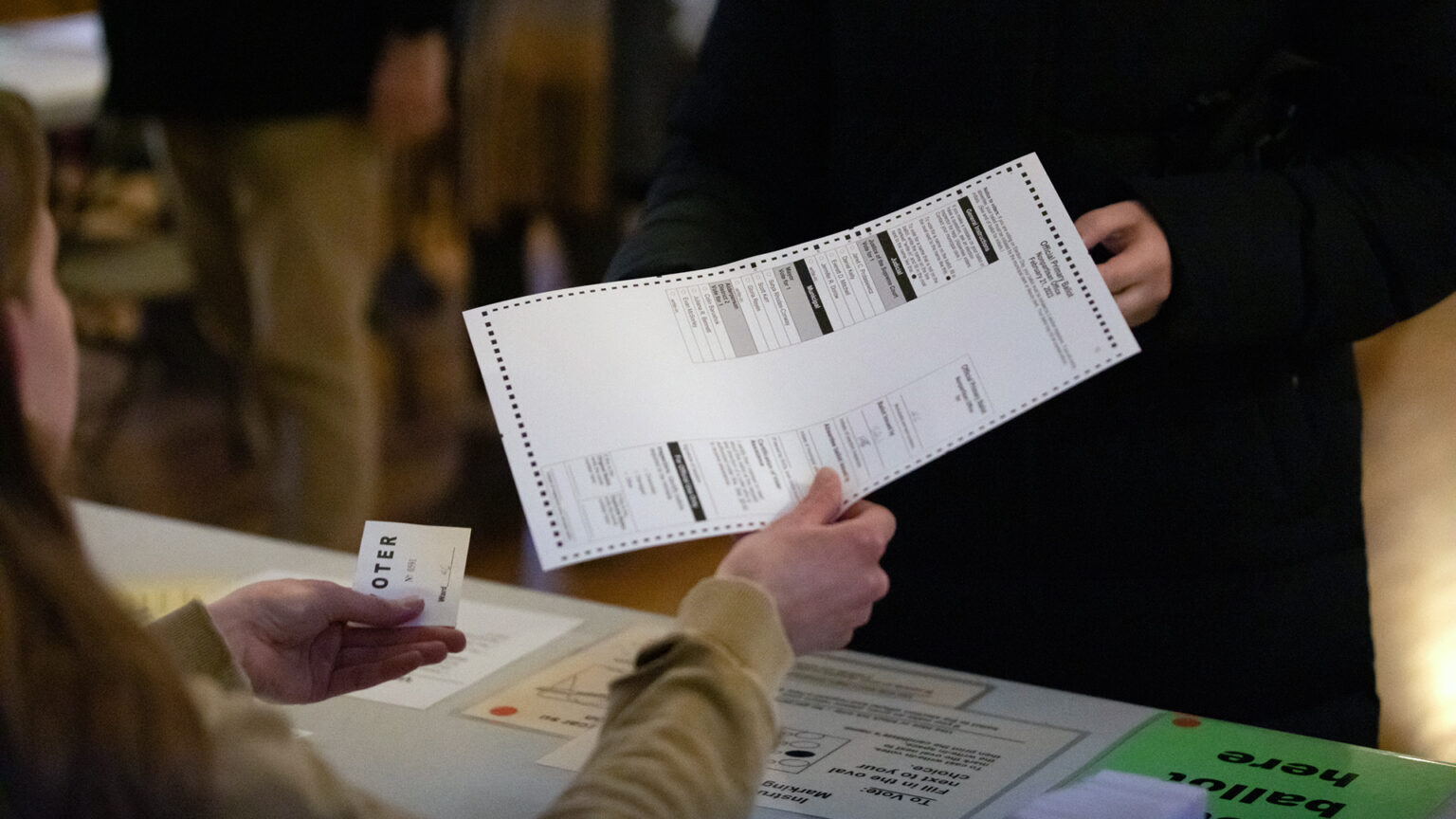
A poll worker hands a ballot to a voter at the Gates of Heaven polling location on Feb. 21, 2023, in Madison. The most common election-related crime charged over the past decade in Wisconsin is for voting while on felony probation, though more could be done to prevent such voting from happening. (Credit: Amena Saleh / Wisconsin Watch)

This article was first published by Votebeat and Wisconsin Watch.
In 2020, Watertown resident Glen Godfroy walked into the polling place where he had voted for years. This time, he wasn’t sure if he could vote — he was on probation for a felony DUI offense. So, he said, he asked a poll worker to verify his status.
The official checked a list of ineligible voters that the Wisconsin Elections Commission distributes across the state and didn’t find Godfroy’s name, he said. So Godfroy cast a ballot and went home.
Nearly a year later he was charged in Jefferson County with illegal voting for casting a ballot while on felony probation. He ultimately pleaded no contest and was ordered to pay $1,150, plus attorney fees, he said.
“It kind of pissed me off,” he said. “I didn’t find out about it for 10 months.”
Godfroy is just one case of an ineligible voter who slipped through the cracks of a system that is supposed to prevent people on felony probation from casting a ballot illegally — and faced fresh criminal charges for it.
Although election fraud is extremely rare in the state, Wisconsin Watch in 2023 documented 109 cases between 2012 and 2022 of people being charged for voting or registering to vote while on felony probation. That was the most common election-related infraction in that time frame, though still only an average of under 11 people a year.
Such infractions can occur, Votebeat has found, because of shortcomings in the system used to flag people with felony probation status before they vote. The problems could be addressed with a change to state law, but the Legislature has shown little interest.
Defendants often say in court filings that they didn’t know they weren’t eligible to vote. In many of the criminal complaints, meanwhile, prosecutors allege that the defendants erred by incorrectly checking the box on their voter registration form saying that they were not on probation, extended supervision or parole for a felony conviction. If they had answered correctly, the form would have alerted election officials that those Wisconsin residents couldn’t legally vote.
“The responsibility is on the felon serving their sentence to ensure that they’re not breaking the law,” said Fond du Lac County District Attorney Eric Toney, who has charged several county residents with election fraud.
But experts say some of the blame should be directed at a list used before and on Election Day that shares ineligible voter data with local officials. They say the list is problematic because it depends on multiple state and local agencies sharing the information promptly, creating more opportunities for miscommunication and mistakes in a state where localities take the lead in administering elections.
They also point to the confusion created by Wisconsin’s laws on when people with felonies regain their right to vote.
“Many states have very confusing laws on the books in terms of voting rights restoration for individuals who have been released from incarceration,” said Jonathan Topaz, a staff attorney at the American Civil Liberties Union’s Voting Rights Project. “And states are routinely failing in their duty to provide voters with the assurances and the information that they need to make informed decisions.”
Effects fall heavily on people of color
While the number of affected voters in Wisconsin appears to be small, the consequences can be severe. The problem disproportionately affects people of color, and those who are prosecuted end up further enmeshed in the criminal justice system.
Out of the 109 people charged between 2012 and 2022 for illegally voting or registering to vote while on felony probation, 36, or about one-third, were Black, and 56, or just over half, were white, according to Wisconsin Watch. One was Latino, one was Asian, and nine were Native American. The racial identities of the other six weren’t clear.
As a whole, 80% of people in Wisconsin are non-Hispanic white, 7% Hispanic of any race, 6% Black, 3% Asian, and about 1% Native American; 2% are two or more races.
Ion Meyn, an associate professor at the University of Wisconsin Law School, said voter disenfranchisement laws typically affect people of color disproportionately.
"If you take a map of where Black people live, in terms of concentration ... and then you map over that rates of incarceration, it maps out exactly," he said. "And then if you put that same map and put in ... the highest disenfranchisement rates — exact same place."
A Wisconsin Elections Commission spokesperson acknowledged the list's shortcomings but noted that the percentage of people with felonies who vote has been too low to affect the outcome of elections.
Toney, the Fond du Lac prosecutor, said people convicted of felonies get told repeatedly that they can't vote until their civil rights are restored.
"If people are violating election laws," he said, "there has to be accountability so the public has confidence in our elections and to deter others from engaging in that type of behavior."
How some voters get through the screening process
Wisconsin has processes to flag ineligible voters before, during and after elections. But in some cases the system catches voters after they vote, rather than stopping them from voting.
One shortcoming is that the systems involve multiple agencies, said Patrick Berry, counsel in the Brennan Center for Justice's Democracy Program.
"We're just not aware of any state that does a great job at keeping track of who's ineligible to vote after a felony conviction, the reason being there's a number of government agencies involved," he said. "They always don't have great practices in place where they're sharing data with one another."
Every day, the Department of Corrections shares with the Wisconsin Elections Commission a file containing the names, municipalities and counties of individuals on supervision for a felony conviction. That information is checked against the names of registered voters in WisVote, the state's voter registration database and election management system.
When WisVote flags a voter, it automatically notifies the local clerk about the potential match. In a 2020 election audit, the Legislative Audit Bureau found that it took clerks a median time of five days to act on the matches. In about 8% of cases, clerks didn't act in time for Election Day. But by the following year, they had inactivated the registrations of 820 of the 821 flagged people.
Wisconsin has another system that election officials use on Election Day for people seeking to vote using Wisconsin's same-day registration option. Under that system, election officials consult a list of ineligible voters before processing the registration. But it's still possible for a person who is flagged this way to continue to register and cast a ballot.
Unlike the statewide list paired with WisVote, this list of ineligible voters is specific to a particular municipality.
If somebody appearing on that list tries to register on Election Day, state law requires local election officials to tell that person they're ineligible to vote. If the person accepts that, election officials reject the registration.
If the person disagrees, though, the officials are supposed to call the election commission to verify the person's eligibility. If the commission says they're not able to vote, the official can allow the person to register as long as they mark the application as "ineligible to vote per Department of Corrections."
If a person on the list insists on voting, state law requires the election official to challenge the ballot. A challenged ballot is counted for the election but could be disqualified later if an election official, a board of election commissioners or another voter proves that the person is ineligible.
Most of the people charged with voting illegally while on felony probation were caught during a post-election audit.
In that process, which is required by law, the Wisconsin Elections Commission checks the list of people who registered within 20 days of the election against the Department of Corrections' statewide list of ineligible voters and forwards cases of potential illegal voting to local jurisdictions.
Court documents in many of the cases of illegal voting don't mention the ineligible voter list or why the voter was able to cast a ballot. The likely reasons vary, such as people using an alias that doesn't appear on the list, somebody appearing on a list different than the one at the person's polling place, people voting despite being on the list, or election officials not checking the list.
"No system — including this one — is perfect," Wisconsin Elections Commission spokesperson Riley Vetterkind said in a statement. "To successfully identify and prevent every felon from voting, the list of felons would need to be up-to-date, flawlessly identify each time a felon changed their address, account for all aliases and/or name changes, account for all absconders, and ensure near perfect data quality."
The list could work better if municipal election officials were required to consult a statewide list of people with felony convictions before registering a voter. But that would likely require a change in state law, Vetterkind said.
Law makes eligibility rules confusing
Beyond the lists that state and local officials use, another source of confusion is the way Wisconsin handles voting rights for people with a felony record.
Some states never ban people with felony convictions from voting, or they restore their voting rights automatically after they're out of jail or prison. Other states require people convicted of felonies to receive a pardon or complete some other process to explicitly get their voting rights back.
Wisconsin is among 15 states that require people with felonies to wait to vote until they finish probation or extended supervision but then restore that right automatically, according to the National Conference of State Legislatures. So in these states, there's a period of limbo that creates confusion over who can vote and when.
And among these 15 states, Wisconsin and Idaho are the only two that also allow registration up through Election Day, according to the National Conference of State Legislatures.
Some Black residents in Milwaukee's north side who had been in the criminal justice system said they received inadequate or no support to understand their voting rights, according to a report conducted by the nonprofit organization Black Leaders Organizing Communities. Some thought their felony record permanently disenfranchised them, the report stated.
"In Wisconsin and around the country, people with felony records are often confused about whether or not they are eligible — as are many parole officers and even election workers, who should be able to help," the report stated.
Between the flaws in the flagging system and the confusion around the voting rights of people with felony convictions, "it's often unjust to prosecute people for voting while ineligible when they didn't actually know that they weren't eligible," Berry said.
Many of those issues could be avoided if Wisconsin restored people's voting rights after they're released from confinement, Berry said, calling that policy “easy for everyone to understand." But such a change to state law, typically supported by Democrats, is highly unlikely under the current Republican-controlled Wisconsin Legislature.
In Wisconsin, many cases result from people registering the same day they vote, Votebeat found. Ballots cast by same-day registrants in Wisconsin are typically counted just like ballots cast by anybody else. Other states, like Utah and Nevada, allow same-day registration but consider those voters' ballots as provisional, allowing election officials to verify voters’ information and eligibility before the ballots are counted.
Topaz, from the ACLU, said making clearer rules — whether that's allowing people to vote regardless of their criminal history, or restoring their rights as soon as they're out of jail or prison — would help solve the issue, as "states are utterly failing to provide clear guidance to voters about their voter eligibility, and good faith voters are getting caught in the crossfire."
Localized lists add to risks in Milwaukee
Checking voters against the list appears to be especially complicated in Milwaukee, which is where about 30 of the 109 in Wisconsin were charged for illegally casting a ballot or registering to vote, Wisconsin Watch found.
Unlike smaller towns, which may have a single polling site and a complete ineligible-voter list for the municipality at that site, Milwaukee breaks down the list by polling place. Each site gets a list of ineligible voters whose last registered address with the Department of Corrections was in a ward of that polling site, former Milwaukee Election Commission executive director Claire Woodall said.
A citywide list would be "extraordinarily large" because it would show the aliases of each person on it, Woodall said.
"And so if someone has moved, then they're not on the list," she said, and there's nothing to stop them from registering and voting.
Most of the Milwaukee cases, Woodall said, were likely a result of the voter moving to a different ward, or a poll worker not checking the list.
Woodall said the system could improve if Badger Books, the state's electronic poll books, could incorporate the list of voters with felonies to prevent them from registering or voting. But the system doesn't currently have that capability.
Mike Haas, Madison's city attorney and the former administrator of the Wisconsin Elections Commission, said the system’s issues stem from a large number of people involved in the process.
"Elections are a human process," he said. "Voters might make mistakes, and with something like this, we have Corrections Department staff, WEC staff, clerks, poll workers. At any point in the process, it could be something falling through the cracks and a mistake being made."
But Haas said the system is mostly effective at preventing illegal voting, pointing to the 109 cases prosecuted between 2012 and 2022.
"You take that number and you take the total number of voters over that 10-year period of time," he said. "Even if you took all those cases as something that went wrong, there's probably some businesses that would take that margin of error."
Haas pointed out that most Wisconsin municipalities didn't even require voters to register until 2006, and there wasn't a statewide voter registration system until after that.
"You think of how far we've come in 18 years with all these matching criteria and technology involved," he said. "And it seems like the more precise we get, the more demand there is to be exactly perfect. Maybe someday we'll get to exactly perfect, but it's come a long way."
Alexander Shur is a reporter for Votebeat based in Wisconsin. Contact Alexander at [email protected]. This article is made possible through Votebeat, a nonpartisan news organization reporting on voting access and local election administration across the U.S. Sign up for Votebeat's free newsletters here.
The nonprofit Wisconsin Watch collaborates with WPR, PBS Wisconsin, other news media and the University of Wisconsin-Madison School of Journalism and Mass Communication. All works created, published, posted or disseminated by Wisconsin Watch do not necessarily reflect the views or opinions of UW-Madison or any of its affiliates.
 Passport
Passport




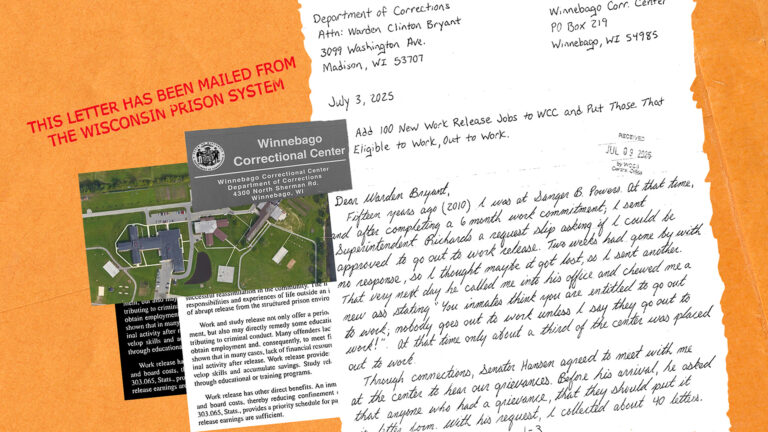
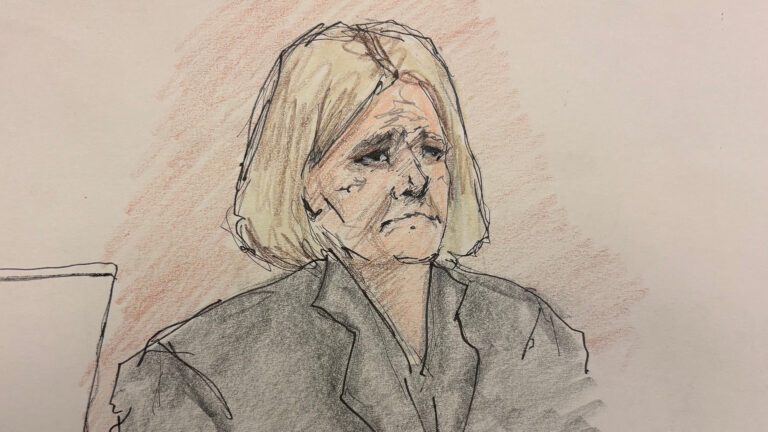
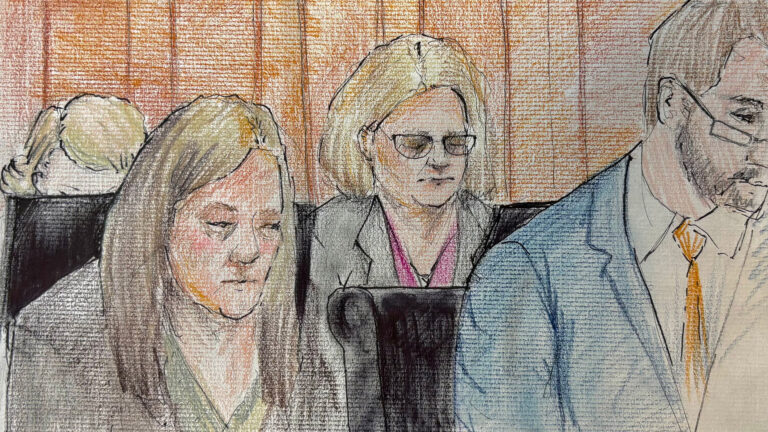
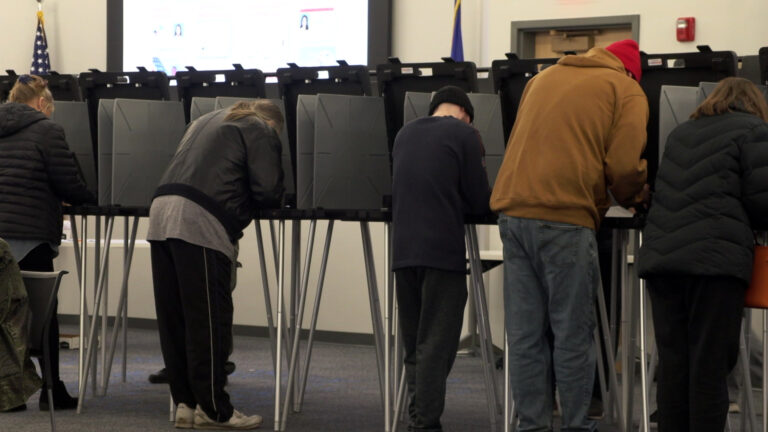
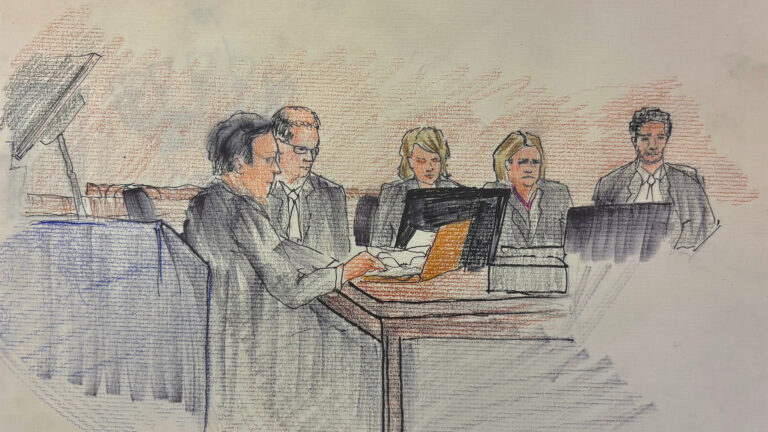
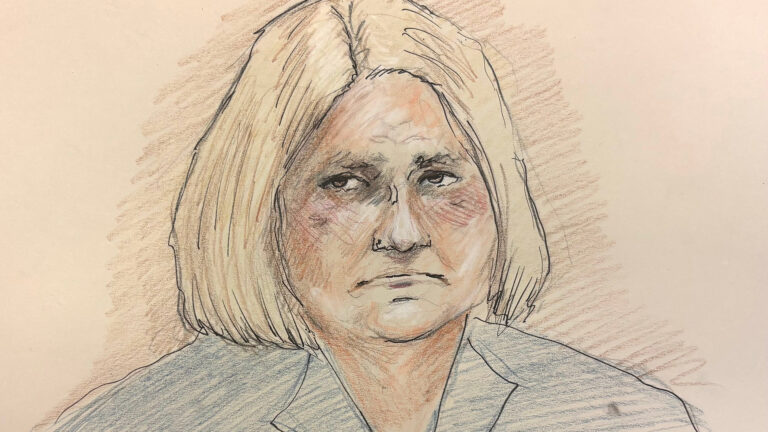

Follow Us